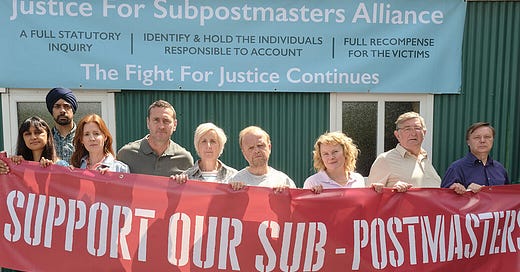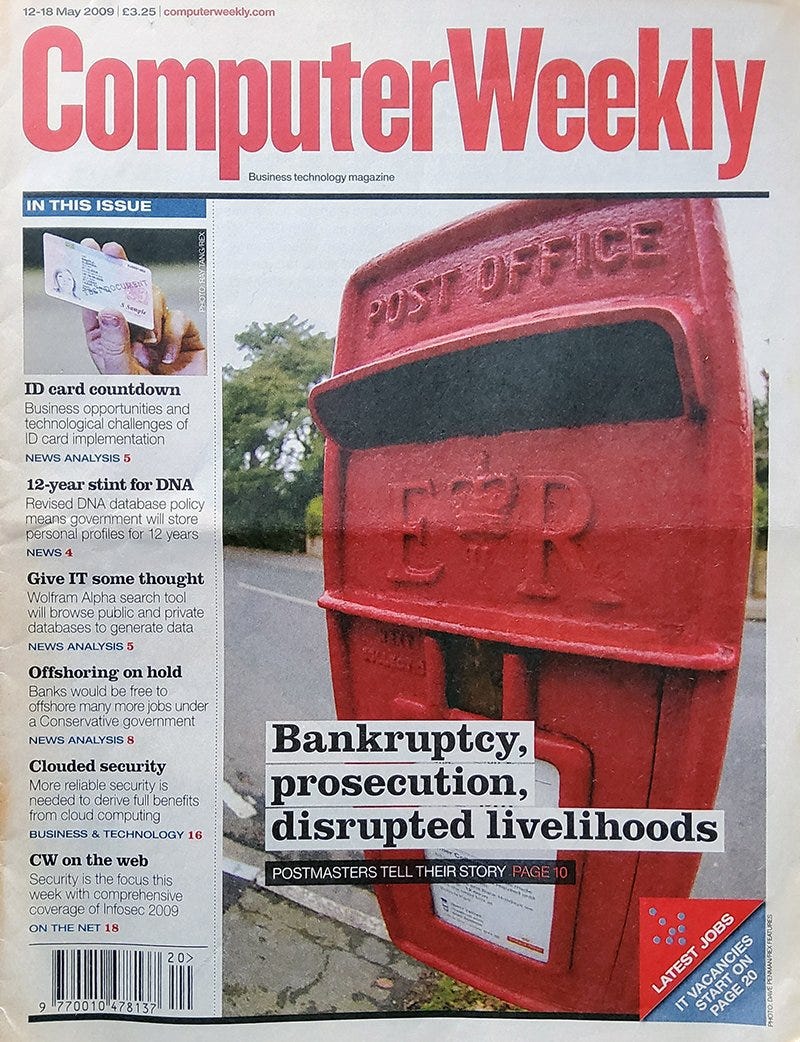Mr Bates vs The Post Office: A Testament To The Power of Popular Culture
Long-overdue action in the ITV drama's wake isn't a failure of journalism, or our country's ability to care, but British telly doing what it does best
It’s been nine days since Mr Bates vs The Post Office began: a four-part dramatisation of what the Criminal Cases Review Commission called “the most widespread miscarriage of justice”. One that now, frankly, seems entirely mad.
Between 1999 and 2015 the Post Office convinced themselves, and everyone else, that nearly a thousand branch managers - normal men and women, respected figures in their communities - had suddenly started stealing money. Ignoring repeated claims of bugs in Horizon, the new computer system developed by Fujitsu for automating accounting processes, the Post Office pursued private prosecutions in such numbers that it averaged around one a week (they operated independently of the CPS).
Ultimately, more than 900 subpostmasters were prosecuted, 736 were convicted of fraud, false accounting and theft, and thousands of others (3,500 to be exact) blamed for shortfalls in their accounts. Lives were destroyed, overnight. And not a single person responsible has ever been brought to account.
As these (enraging) historic events unfolded on screen on New Year’s Day evening - and across the three nights that followed - we watched as simultaneously, off screen, Shit Actually Happened. The two-decade-plus scandal, for which justice has always moved at a glacial pace (if at all), seemingly now attacked with speed in the face of huge public emotion.
But it’s not been without hand-wringing: that it wasn’t the acres of journalism produced over the years, or even the tireless campaigning by the very human beings who’d been through the very worst things, that galvanised the country into demanding action from those in power but, of all things… telly.
While we can’t know the moment the dam collapsed, if I had to put money on it, I’d say it was about 9:03pm on January 1st. The opening scene of Mr Bates vs The Post Office: subpostmaster Alan Bates (Toby Jones) takes on the Bad Men with Briefcases steaming mob-handed into his Post Office branch. “Management,” warns his wife Suzanne (the ever-excellent Julie Hesmondhalgh). “Thugs in suits,” he clarifies.
Toby Jones has never been more, well, Toby Bloody Jones: a getting-on subpostmaster and weekend walker in a v-neck jumper, back rod-straight in righteous defiance as he refuses to submit (even though he’s already lost the fight). The suits are here to close his branch after taking his job, so he says his piece from behind the counter that soon won’t be his, the self-respect of an ordinary bloke striking.
“Post Office Limited is stealing my livelihood, my shop, my job, my home, my life-savings,” he announces, before finishing on perhaps his most significant loss: “My good name”.
The dam goes.
Since Mr Bates aired, the Metropolitan Police, already investigating potential offences of perjury and perverting the course of justice against two ex-Fujitsu experts, announced a new investigation into possible fraud offences for the prosecutions; ministers said they were urgently looking at ways to hasten compensation and exoneration, including legislation; and ex-Post Office CEO Paula Vennells handed back her CBE - awarded for her work with The Post Office a decade after concerns were first reported - once a million people signed a petition demanding its return (prior to Mr Bates, it reportedly stood at 4,000 signatures).
Clearly, (successive) governments, responsible ministers, Post Office execs and the Police shouldn’t be kicked up the arse and into action by a TV series. It’s a disgrace. But if that’s what it takes, so entrenched is the resistance in some to transparency, truth and justice, then so fucking be it.
And the rest of us? Is it really so shocking that a primetime TV drama created such a groundswell of support and outrage? And why would it be, as seems to be suggested, shameful? (Anyone else got the tartness of snobbery on their tongue? It was on television? On…(gasp) ITV?!
Mr Bates Vs The Post Office, and the events since, don’t point to a failing of journalism as some have claimed, or proof that the media simply didn’t bother reporting the scandal.
This Press Gazette article tracks the media coverage: the first investigation into Horizon came from Computer Weekly’s Rebecca Thomson in 2009, and was followed up by BBC Wales. In 2011, Karl Flinders at Computer Weekly picked up the story from Thomson, and, freelancer Nick Wallis (who wrote the book, The Great Post Office Scandal) broadcast an investigation for the BBC, before later making Panorama (twice) and a Radio 4 series. Private Eye also began covering the scandal in 2011, and was followed in the years to come by the Daily Mail, Yorkshire Post, and The Times.
The original report, which made the cover, can be read here.
Of course, great journalism, seeks to tell compelling human stories, to render a personhood in text (and these days, in audio and video), with as much colour as possible. But much of telly’s unique power lies in the canvas that the human experience is so vividly painted on, combined with sheer scale and precision of delivery. Put simply, stories that are upsetting in the written word, are unbearable when summoned to life on screen. Stories that are then torpedoed straight into people’s homes, en masse (part one of Mr Bates was watched by more than nine million viewers).
And as people gather on their settees, with the world locked outside, the best writing, the best storytelling, the best drama, will make them weep, rage, change. Break their hearts, call them to action. It comes down ultimately to connection. To getting people in the gut. Or the heart. Or both. And Mr Bates (written by Gwyneth Hughes), manages this by shrinking a big, unwieldy, complex story of corporate reputation and legal battles, down to a simple, deeply human story.
We see Jo Hamilton (Monica Dolan) who, after investigators turn up and blame her for the £36,000 shortfall in her Post Office accounts, cries out in horror: “Why would I do this? I love my Post Office”. Those last five words holding the memory of every pension book she looked after for “her ladies”, every scone she baked.
We see Saman Kaur (Krupa Pattani), based on the real Jess Kaur. One of the ‘lucky’ ones cleared after the Post Office was forced to concede that her pin pad was faulty. Her mind is destroyed in the three years it takes for charges to be thrown out, tormented by an impossible choice: plead guilty and escape prison, or plead not guilty, but risk custody for a crime she didn’t commit. We see her stare, the absence, as she sinks: as horrifying as her suicide attempt, the convulsing of her body during ECT.
While focusing on just a handful of the real human stories, Mr Bates still conveys the scale and severity of the full picture. The 236 people sent to prison in terror, the hundreds more left destitute, homeless, divorced, physically and mentally-destroyed. Some suicidal, almost all without-reputation. As a viewer, you’re as furious and devastated for those off screen, who step in the shadow of those taking centre stage, as you are for those on.
My god, the despair. Just imagine. Well, Mr Bates helps us to do just that.
-
Would the impact have been so great if Mr Bates had landed on Apple TV+, Prime Video or Netflix? Absolutely not. The power of a linear channel to create a nationwide tune-in moment, millions reaching for the remote at the same time, is still unrivalled. Telly - and specifically a big, mainstream series on a traditional channel - was always likely to be the thing that provoked a full-scale pricking of public consciousness.
We should see the last week as, of course so overdue the sky should be ripped down, but also, in the end, a testament to the power of screen culture, of popular culture, of British telly. Mr Bates now standing beside Cathy Come Home, Three Girls, Hillsborough, Who Bombed Birmingham, Help, Sunday: the slices of drama that, whether by explicit design, or happy creative coincidence, made a real difference.
Here you can see how television is a bed fellow, not rival, of great campaigning journalism. And that it owes, well, everything to the tireless campaigning by Alan Bates and all of those who suffered unthinkable injustices. And wouldn’t exist without the journalists who told the stories of those wronged over and over and over again, who doggedly reported every cough and hack along the way.
Still want to wring hands? Here are a few things I think deserve it: that (so far), four suicides of subpostmasters have been reported; that the government still awards IT contracts to Fujitsu; that the only people ever prosecuted were subpostmasters; that Paula Vennells may have handed back that CBE but still pocketed 4.5 million in pay for her work at The Post Office (including an estimated £2.2million ‘performance related bonus’); that now-Liberal Democrat leader Ed Davey, while postal affairs minister, refused to meet with Alan Bates; that even after a 2012 Post Office-funded investigation and 2019 High Court victory confirmed Horizon faults, only 93 people saw their convictions overturned (and only 30 have been compensated); that the Post Office, even after publicly apologising, was still opposing appeals as recently as a few months ago.
And the bigger picture: one that would feel almost indulgent to mention in the same breath, if it wasn’t for the fact that it’s why I’m writing this. The reality of the bleak landscape for British drama and British culture more widely, its potential and power cut off at the knees by public funding cuts, the fight to secure investment, rising costs and risk averse industries prioritising profit above all else.
“It’s now harder to fund these British stories,” said ITV’s Head of Drama Polly Hill, who commissioned the show. “We must be able to keep making them, because Mr Bates vs The Post Office shows that drama can help make a difference, and importantly that the audience wants to hear them.”
And boy do we. We’re thirsty for them. Fucking parched, in fact. So let your hands hang loose now. And ignore that most British of beliefs, the one that we’ve got so used to it’s like wallpaper: that culture is a right for the rich and not even a privilege for anyone else. That it can’t change owt, not really.
Because they forget (but we mustn’t): popular culture is ours, for us. And look, just look, at what it can do.
Mr Bates vs The Post Office is available to stream on ITVX
-







Brilliantly put...thank you!
Excellent!